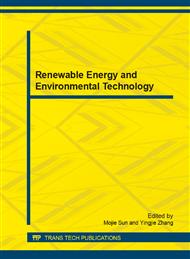p.4441
p.4445
p.4449
p.4455
p.4461
p.4465
p.4471
p.4475
p.4482
Research on the Low-Carbon Evolutionary Model of Chinese Traditional Industrial Clusters Based on Evolutionary Games Theory under Low-Carbon Constraints
Abstract:
The low-carbon evolution of traditional industry cluster is the key to a low-carbon economy, and also a frontier of industry cluster theory research. The paper uses evolutionary game theory to construct a low-carbon evolutionary model of Chinese traditional industrial clusters, which considers uncertain factors such as political, economic, cultural, etc. Through the analysis of the cluster low-carbon evolutionary paths and stable equilibrium strategies, the model reflects the inherent law of clusters low-carbon evolution. Finally, the paper gives advices to promote industrial cluster agents to adopt the low-carbon cooperation strategy.
Info:
Periodical:
Pages:
4461-4464
Citation:
Online since:
October 2013
Authors:
Price:
Сopyright:
© 2014 Trans Tech Publications Ltd. All Rights Reserved
Share:
Citation:


